The Bern World Cup last weekend was the first time Bern has hosted a Boulder World Cup and the first kept coming all weekend.
Erin McNiece won her first gold medal, becoming the first British woman to win both Lead and Boulder gold medals.
Yufei Pan also won his first World Cup gold medal. His win was also the first Boulder or Lead World Cup win by a Chinese athlete.
The event was also first to be held at the new BernExpo event hall. The Bern World Cup has been confirmed for 2026 in the same location. It will be held from 22nd to 24th of May.
Erin McNeice wins her first Boulder gold medal.
Erin McNeice topped all the boulders, including the physical 3rd boulder, to win her first gold medal. She is the second British woman to win a boulder gold medal after Shauna Coxsey, who won her last World Cup in Navi Mumbai in 2017. McNeice is the first British woman to win both Lead and Boulder gold medals.
“I feel so happy, elated, and quite shocked!” said McNeice after the competition. “I want to do all the European World Cups and there are quite a lot of them, I decided to skip the American competitions so that I could have a chance to train between the Asian and the European tours.”
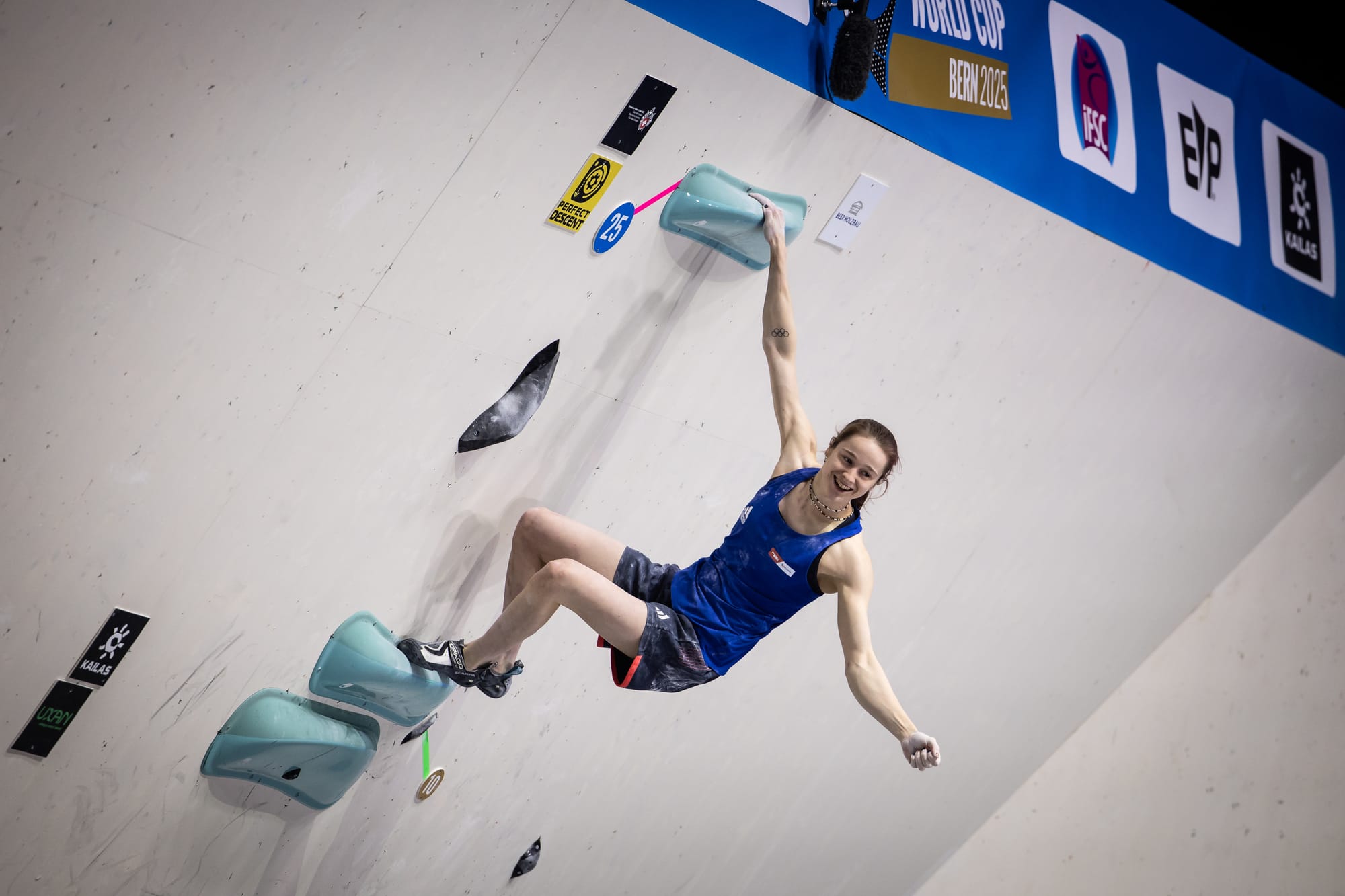
Annie Sanders won the silver medal thanks to flashing the first two problems in the final. She fell on the last move of the physical boulder. The medal is her fifth Boulder World Cup medal.
Sanders wrote on Instagram after the competition that “Bern has always had a special place in my heart, so getting to compete in the final here in front of such an electric crowd was an unforgettable experience. The finals were incredible, the setting was great, and despite a couple of hiccups, I'm super happy to walk away with the silver.”
Miho Nonaka won the bronze medal thanks to a flash on the physical boulder and reaching all four zones. She was also the only athlete to top the physical boulder in the semi-final. The bronze medal in Bern is her 25th Boulder World Cup medal in her 55th World Cup; she last won a medal in Innsbruck back in 2023. The podium also helps her secure a spot on the Japanese World Championship team.
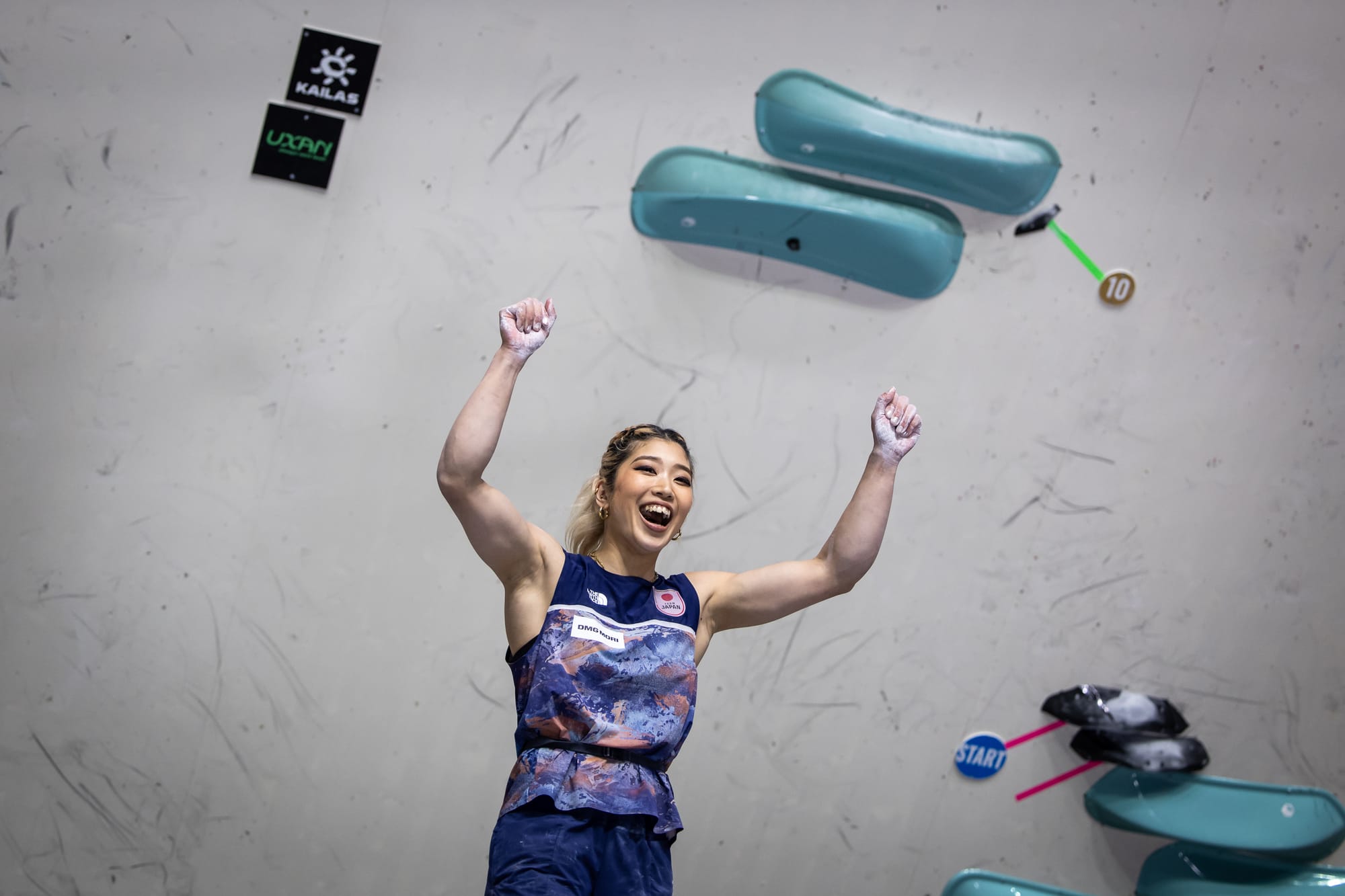
The final was high-scoring and full of tops, but the setting was great. The complaints around separation seem to die down if the boulders are great. The highlight of the round was the physical third boulder, which only Erin McNeice and Miho Nonaka topped.
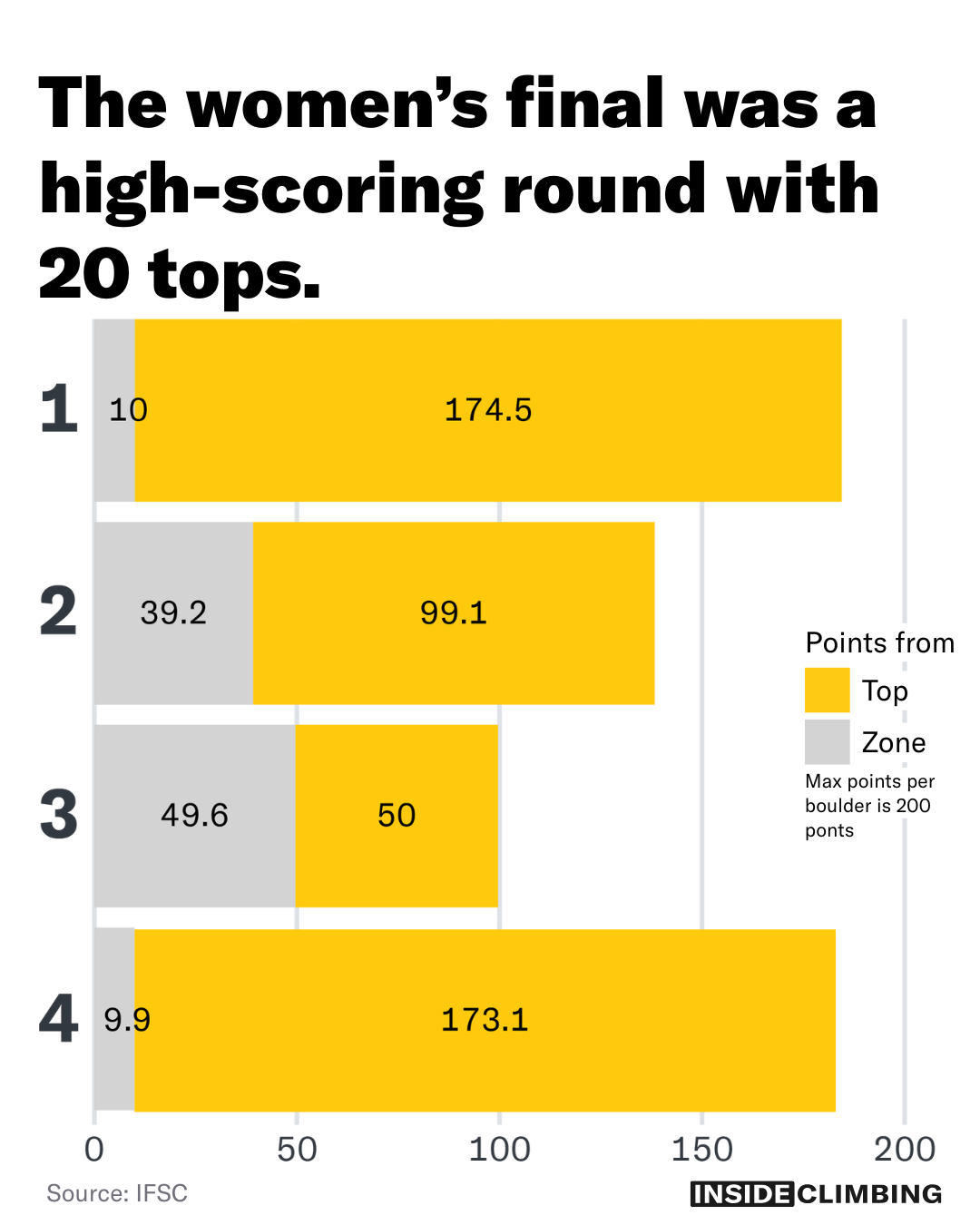
Oriane Bertone missed out on the final and finished 10th in the competition. She is still first in the Series with 3,570 points. Mao Nakamura finished 5th in the final and is now only 635 points behind Bertone with 2,935 points. Bertone needs over 545 points (higher than 5th place) to win the series if Nakamura wins in Innsbruck.
Annie Sanders is in third with 2,795. She can still win the series mathematically as she has only competed in four events so far. Melody Sekikawa is in fourth with 2,425. McNeice's win moves her up to fifth with 2,300 points after skipping the Americas World Cups.
Women's Boulder World Cup Series Ranking
| Rank | Athlete | Country | Score |
|---|---|---|---|
| 1 | Oriane Bertone | France | 3570 |
| 2 | Mao Nakamura | Japan | 2935 |
| 3 | Annie Sanders | USA | 2795 |
| 4 | Melody Sekikawa | Japan | 2425 |
| 5 | Erin McNeice | UK | 2300 |
| 6 | Miho Nonaka | Japan | 2110 |
| 7 | Anon Matsufuji | Japan | 1980 |
| 8 | Agathe Calliet | France | 1803 |
| 9 | Oceania Mackenzie | Australia | 1670 |
| 10 | Zélia Avezou | France | 1655 |
Yufei Pan wins China's first Boulder gold medal
Yufei Pan became the first Chinese man to win a Boulder World Cup in Bern. Pan topped the final power boulder on his second try to seal his win after Sorato Anraku and Dohyun Lee both failed to top the slab. Pan has been competing on the World Cup circuit since 2016, and Bern was his 26th Boulder World Cup.
He previously won medals in Lead, winning a silver in Villars in 2019 and a bronze in Xiamen in 2017. He also finished 2nd in the Asian Olympic Qualifier in 2023 behind Sorato Anraku. He is the only Chinese man to win a Boulder or Lead World Cup medal. Zhilu Luo and Yuetong Zhang are the only other Chinese athletes who have won a World Cup medal in Boulder or Lead.
Pan said after the competition: "It feels unreal. My mind was so empty, I didn’t know how to express myself.
The last few years have been really tough for myself, I struggled so much and I thought I was not good enough,” he continued, then thanking the crowd for the loud applause that followed. “I started to change my mind and not put too much pressure on myself. At the beginning of the season it was not so good, but this time I just wanted to enjoy myself.”
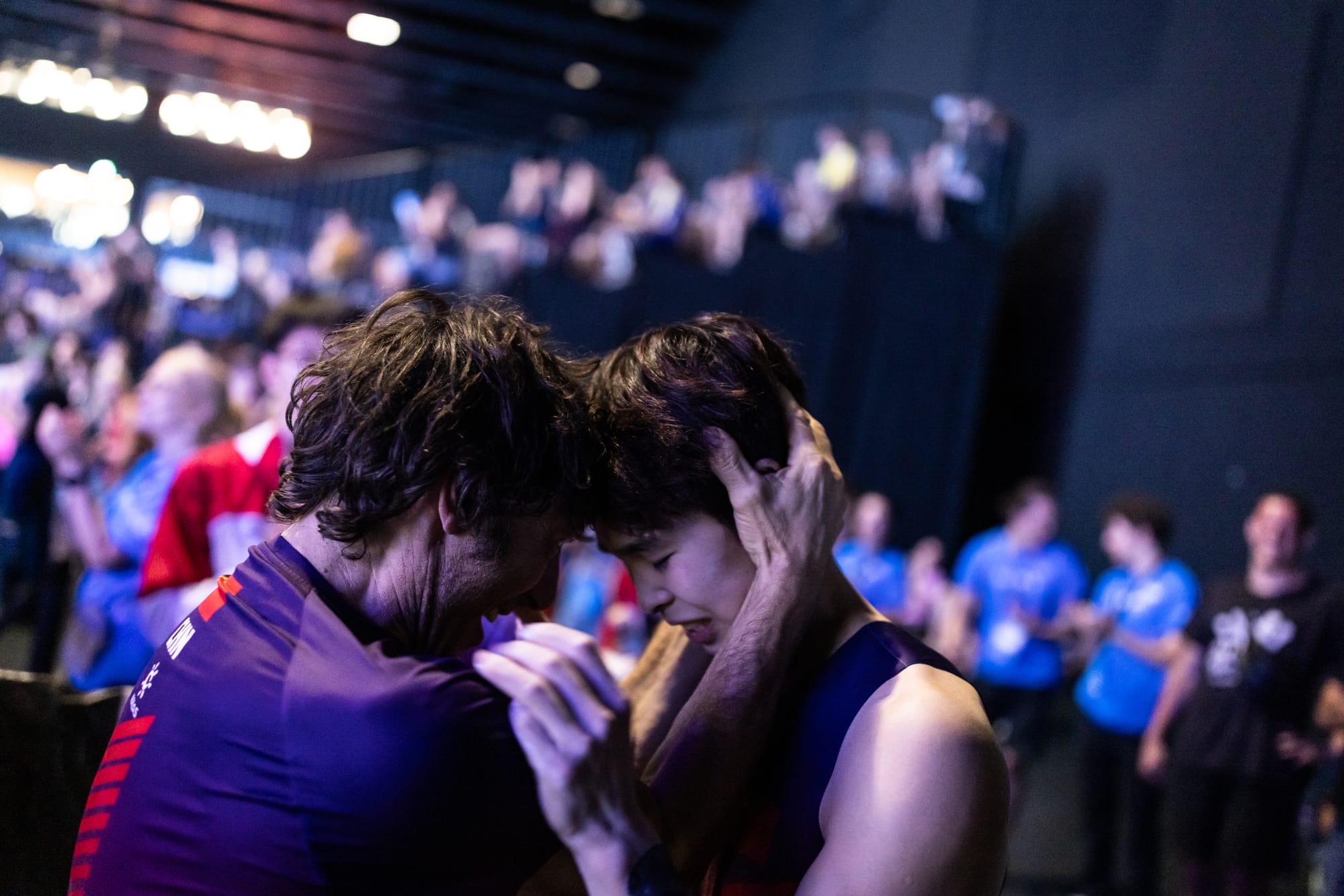
Mejdi Schalck was second, just 0.1 points behind Pan. He took one more try on the second coordination boulder than Pan did on the slab. Bern was his 10th Boulder World Cup medal.
Sorato Anraku finished 3rd, also winning his 10th World Cup medal. Both of his tops on the first and second boulders took six attempts, and his zone on the 3rd boulder took three attempts, which pushed him into 3rd place by 0.4 points. He was 29.2 points ahead of Lee, who was in fourth place.
The setting in both the semi-final and the final was hard, and each round was low scoring. In the semi-final, 13 of the athletes scored below 20 points (2 zones), and there were only 15 tops in the whole round. In the final, there were 8 tops, with athletes needing 3 tops to reach the podium.
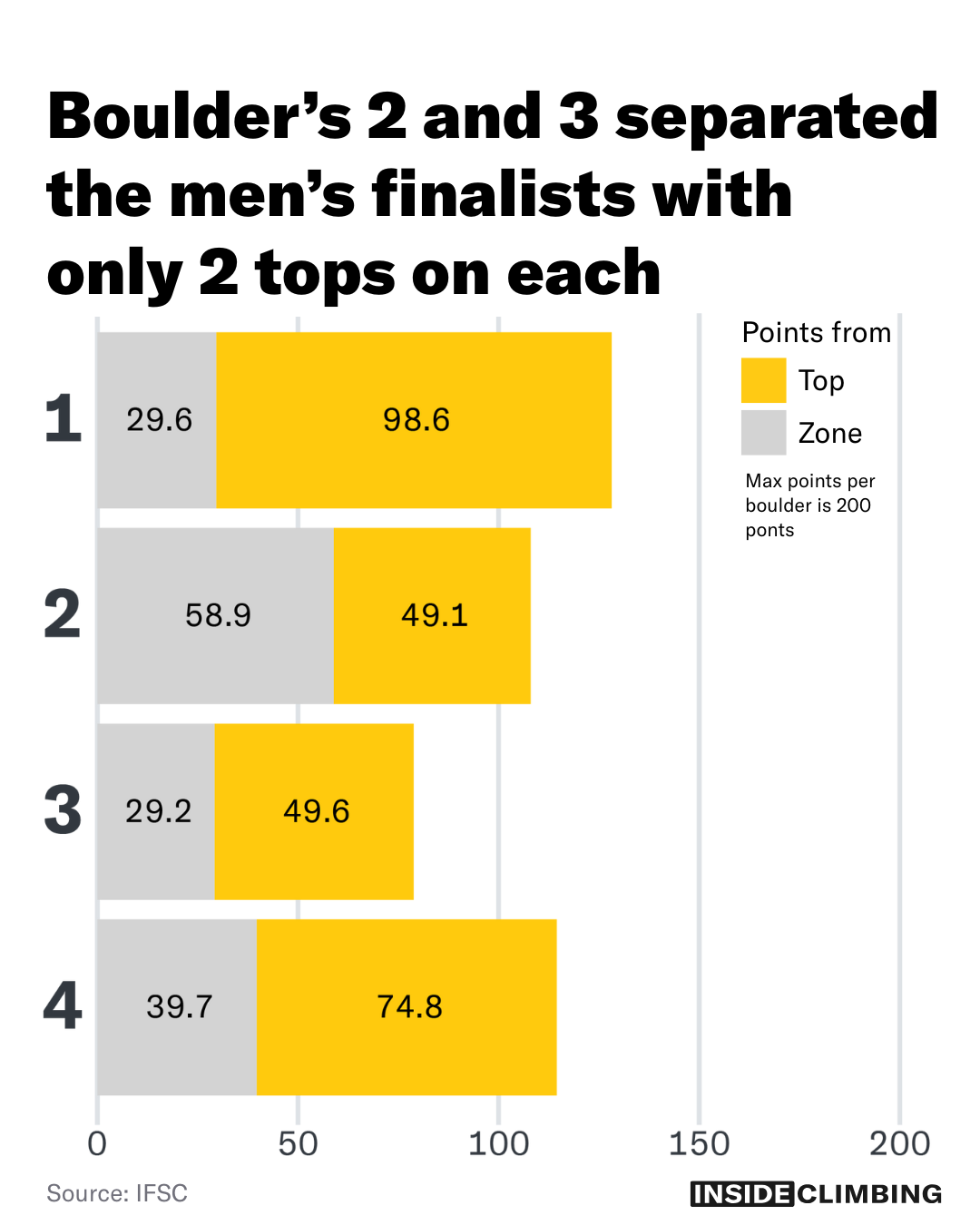
There was a point of controversy over the second boulder. After three athletes tried the boulder, coaches from three countries appealed, claiming the climb was too dangerous. The climb required a co-ordination spin around a pocket that meant some athletes would land horizontally onto the mats. The appeal was upheld, and the rest of the athletes were allowed to climb it.
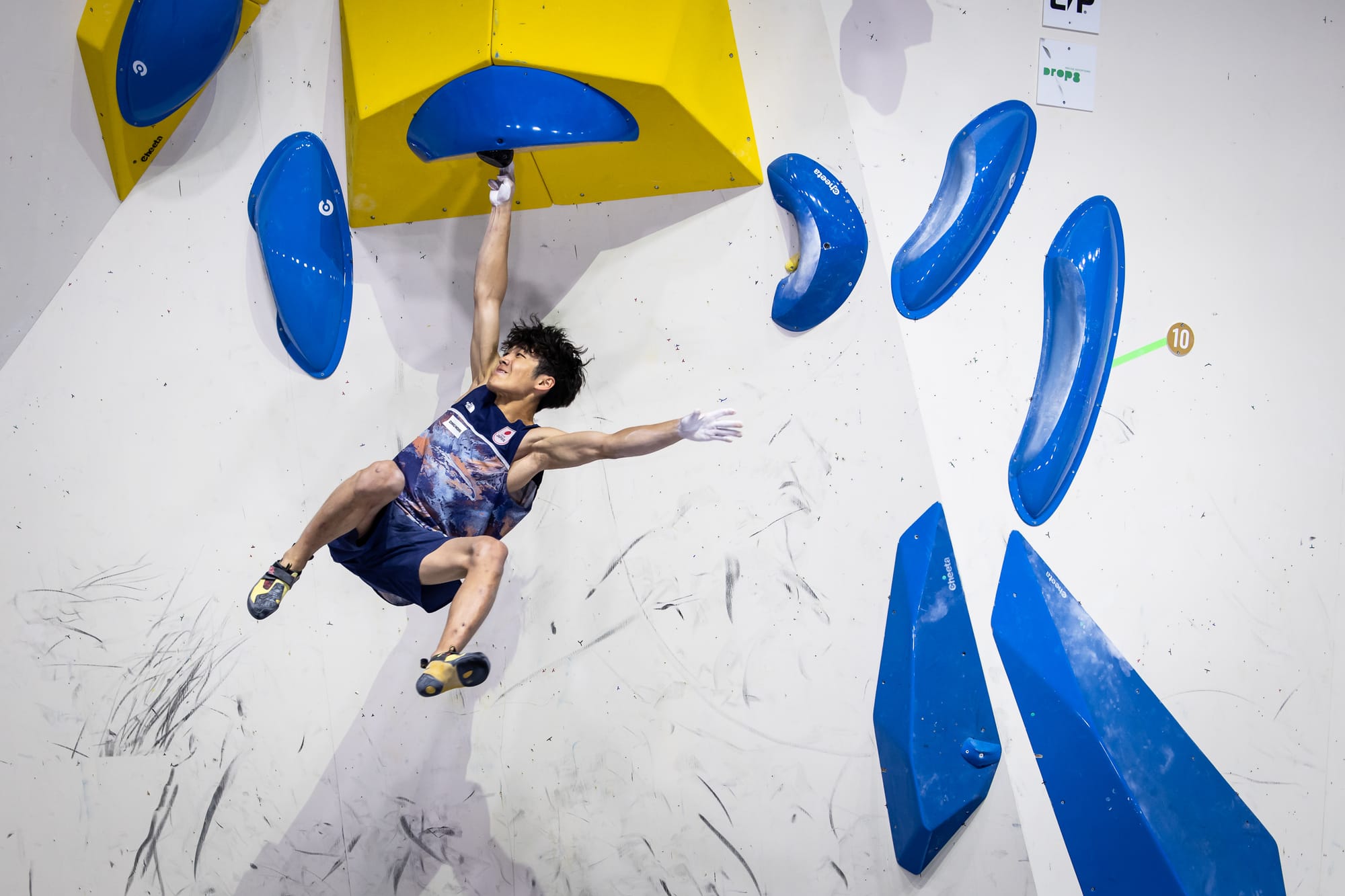
Benjamin Hardy, one of the Japanese coaches, raised concerns on Instagram about the top layer of the mat. He wrote:
“These moves are interesting and cool, and I want to see them in the future. But we really need to discuss what the mat, as our most important safety equipment, should look like. For full body impacts (big contact area) and light athletes, these kind of mats are too hard and they cannot soften the impact enough. During the last competition several athletes experienced stuff necks and whiplashes. We should address this topic rigorously for the safety of the our athletes.”
Anraku's 3rd place wins him the 2025 series with at least 4,495 points. The best five scores across the series are used to calculate the series score, so Schalck cannot catch him in Innsbruck. Anraku joins Jérôme Meyer and Kilian Fischhuber with three Boulder World Cup series wins in a row. He will be awarded his trophy by the series sponsor Euroholds in Innsbruck after the final World Cup of the season.
Schalck's silver medal in Bern secured him second place in the series with at least 3,650 points. This is his highest finish in a Boulder World Cup series after three 5th place finishes from 2021 to 2023. Sohta Amagasa holds onto third place with 2,785 points. Dohyun Lee is close behind, just 225 points behind him, with 2,560 points from four competitions.
Men's Boulder World Cup Series Ranking
| Rank | Athlete | Country | Points |
|---|---|---|---|
| 1 | Sorato Anraku | Japan | 4495 |
| 2 | Mejdi Schalck | France | 3650 |
| 3 | Sohta Amagasa | Japan | 2785 |
| 4 | Dohyun Lee | South Korea | 2560 |
| 5 | Tomoa Narasaki | Japan | 1941 |
| 6 | Hannes Van Duysen | Belgium | 1665 |
| 6 | Paul Jenft | France | 1665 |
| 8 | Meichi Narasaki | Japan | 1615 |
| 9 | Yufei Pan | China | 1569 |
| 10 | Anže Peharc | Slovenia | 1545 |
The final Boulder World Cup is in Innsbruck, Austria, which starts next Wednesday on the 25th of June.





